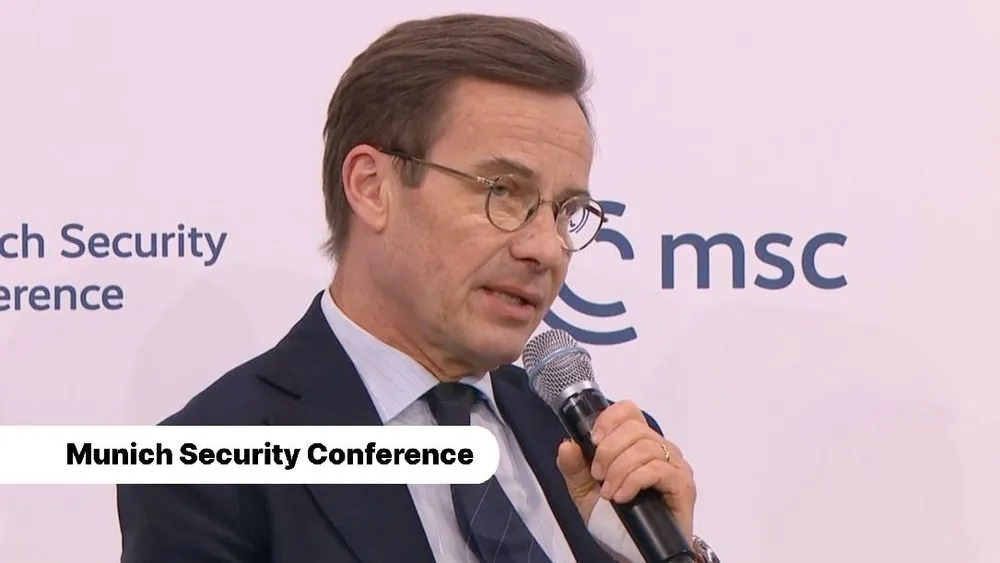Sweden’s PM on suspected cable sabotage: ‘We don’t believe random things suddenly happen quite often’
MUNICH, Germany — Sweden’s Prime Minister Ulf Kristersson told the Munich Security Conference on Saturday that the country didn’t believe a series of submarine cable cuts in the Baltic Sea were simply coincidental.
Speaking on a panel about European support for Ukraine, Kristersson was asked how the Nordic states were responding to what some have speculated is a campaign of sabotage conducted by Russia.
Sweden seized a cargo ship responsible for severing a cable on January 26, although investigators released the ship days later declaring it was “clearly” not an act of sabotage.
“It has been established that a combination of weather conditions and deficiencies in equipment and seamanship contributed to the cable break,” said the country’s prosecution authority.
Sweden’s close neighbour Finland had seized another ship, the Eagle S, a month beforehand after another cable break on Christmas Day. Finnish authorities continue to hold the Eagle S and have issued travel bans to several members of its crew. They said in January they suspected the damage it caused was done intentionally.
“The Baltic Sea is obviously under threat,” said Kristersson. “I think Mette [Frederiksen, the Prime Minister of Denmark] put it in a good way, saying that we are obviously not at war, but obviously not at peace either,” he added, reiterating a point made earlier by his fellow panelist.
Reports citing anonymous intelligence officials have suggested Western authorities are assessing the spate of cable breakages in the Baltic Sea to be accidents rather than acts of sabotage, although experts outside of those agencies have argued such assessments are flawed.
“We are quite careful,” Kristersson said of the Swedish approach. “We don’t easily single out or attribute countries for doing hostile things against our cables, electricity cables or things like that. But equally, we don’t just believe in random things suddenly happening quite often.”
Without disputing the findings of Sweden’s own investigators, Kristersson said: “I fully understand that there might be such a thing as seriously bad seamanship, but they don’t normally occur that often, and on that scale. So there is something pretty odd in that. So we take it extremely seriously.”
It was in the nature of so-called “hybrid threats” that the disruptive activities are deniable, Kristersson added.
The Eagle S, seized by Finland, is alleged to have been previously used as a Russian spy ship, and is part of what Western countries describe as Russia’s “shadow fleet” — a collection of up to 1,000 vessels with opaque ownership structures that sail under flags of convenience to export sanctioned Russian goods, particularly oil.
In the wake of the December incident, NATO allies bordering the Baltic Sea, including Sweden, Norway and Latvia, issued a statement warning they reserved the right to take action against Russian ships that threaten submarine infrastructure.
“Russia's use of the so-called shadow fleet poses a particular threat to the maritime and environmental security in the Baltic Sea region and globally,” the eight allies stated in January, as the alliance also announced Baltic Sentry, described as “new military activity” to “enhance NATO's military presence in the Baltic Sea.”
Kristersson said the new activity provided an increased capability for NATO allies bordering the Baltic Sea to detect and deter acts of sabotage, although he cautioned “obviously we need to do even more to stop them totally.”
“There is a good connection also to the Ukrainian war in that, because the Russian shadow fleet is heavily present in the Baltic Sea, and a lot of oil money [for Russia] is basically coming that way,” said the Swedish prime minister. “So there are different good reasons to stop it. I think we are taking that much more seriously now than we did previously."
READ MORE: Munich Cyber Security Conference 2025 Live Updates
Alexander Martin
is the UK Editor for Recorded Future News. He was previously a technology reporter for Sky News and a fellow at the European Cyber Conflict Research Initiative, now Virtual Routes. He can be reached securely using Signal on: AlexanderMartin.79



